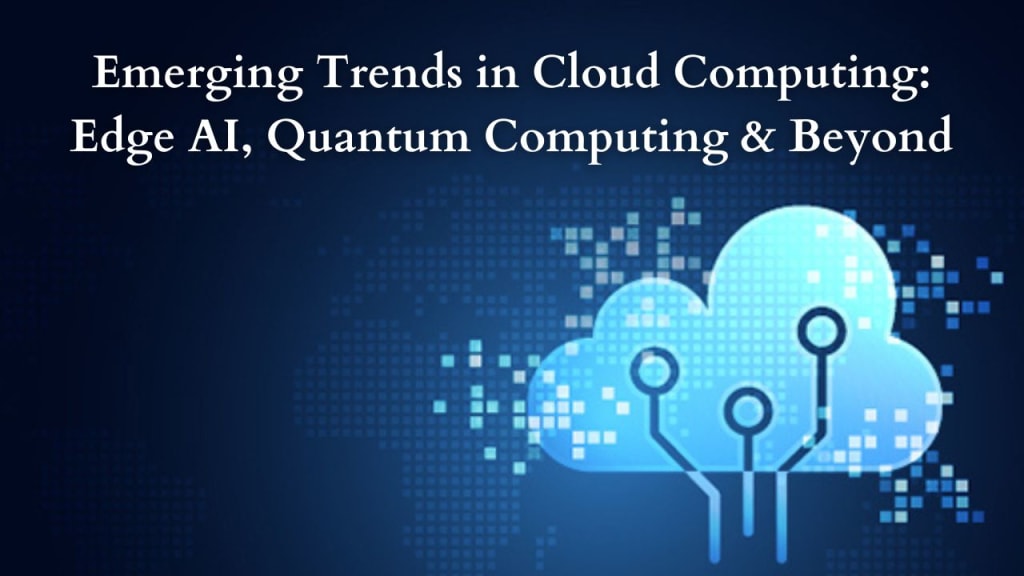Emerging Trends in Cloud Computing: Edge AI, Quantum Computing & Beyond
Navigating the Cloud: Embracing Innovation in a Rapidly Evolving Landscape

Introduction:
Cloud computing has completely changed how both businesses and individuals handle their data and applications. But it's not a static field; it's always changing. New trends are cropping up that are shaping the future of cloud computing. In this article, we'll take a look at two big ones: Edge AI and Quantum Computing. Plus, we'll peek into some other exciting advancements that might be coming down the pipeline.
1. Edge AI: Enhancing Intelligence at the Edge
Definition and Concept:
Edge AI is all about using artificial intelligence (AI) directly on everyday devices like smartphones, smart gadgets, and servers at the edge of networks. Instead of depending on big central cloud servers, it brings the smarts right to where the action is happening.
Importance and Benefits:
- Low Latency: When Edge AI handles data right on the devices themselves, it cuts down on the time it takes to send data to faraway cloud servers for processing. This means decisions can be made instantly, without any delays.
- Privacy and Security: Edge AI can help address privacy concerns by keeping sensitive data localized and reducing the need to transmit data over networks, thus minimizing the risk of data breaches.
- Bandwidth Optimization: Sending AI tasks to edge devices cuts down on the data that has to travel to the cloud. This saves on bandwidth and eases up the traffic on the network, making things run smoother.
Applications:
- Smart Cities: Edge AI can power intelligent infrastructure for traffic management, public safety, and energy efficiency in smart city initiatives.
- Healthcare: Edge AI allows wearable devices and remote patient monitoring systems to analyze medical data instantly. This helps catch issues early and provides personalized healthcare for individuals.
- Manufacturing: Edge AI enhances predictive maintenance, quality control, and automation in manufacturing processes, improving efficiency and reducing downtime.
2. Quantum Computing: Unlocking Unprecedented Computational Power
Definition and Concept:
Quantum computing harnesses the principles of quantum mechanics to perform complex computations exponentially faster than classical computers by utilizing quantum bits or qubits.
Importance and Benefits:
- Exponential Speedup: Quantum computers can solve specific types of problems much faster than regular computers. This includes tasks like breaking down big numbers and making complicated systems work better.
- Quantum Supremacy: If a quantum computer can beat even the best regular computers, it could open the door to big advancements in areas like keeping information safe, finding new medicines, and creating better materials.
- Parallel Processing: Quantum computing takes advantage of the unique behavior of qubits, which can exist in multiple states at once and be connected in a special way called entanglement. This lets the computer explore lots of different answers to a problem all at the same time.
Challenges and Considerations:
- Error Correction: Quantum systems can make mistakes because of something called decoherence and noise. To make sure the calculations are accurate, we need strong techniques to fix these errors.
- Scalability: Creating really big quantum computers that can keep working even if something goes wrong is tough. It means we need to make qubits stay stable for longer, improve how they connect, and get better at fixing mistakes.
Applications:
- Cryptography: Quantum computing threatens traditional cryptographic methods, but it also offers the potential for quantum-resistant encryption algorithms to secure data in a post-quantum world.
- Drug Discovery: Quantum computers are really good at mimicking how molecules interact, doing it super accurately. This helps speed up finding new drugs and materials for all sorts of uses.
- Optimization Problems: Quantum annealing and other special ways of optimizing with quantum computers can tackle tricky problems, like the ones often found in finance, logistics, and managing supply chains.
3. Other Emerging Trends:
- Serverless Computing: Serverless architectures abstract infrastructure management, allowing developers to focus on writing code without worrying about provisioning or scaling servers.
- Multi-Cloud Adoption: Organizations increasingly leverage multiple cloud providers to avoid vendor lock-in, optimize costs, and enhance resilience and redundancy.
- Federated Learning: Federated learning lets different devices work together to train models without sharing their data, which keeps everything private. It's perfect for IoT and mobile apps where data privacy is important.
- AI Ethics and Governance: As AI becomes more common, people are paying more attention to making sure it's used ethically, with clear rules and accountability in how it's developed and used.
- Hybrid Cloud and Edge Computing: Mixing the scalability of the cloud with the quick response of edge computing, hybrid cloud and edge setups give you both flexibility and speed for all kinds of tasks.
Conclusion:
The future of cloud computing is moving really fast with lots of big changes and new technologies coming up. Edge AI and Quantum Computing are just two examples of what's to come, and there are more cool things on the way. Businesses need to be ready for these changes by adjusting their plans to use these new technologies well. They also need to think about things like keeping data safe, making sure they can handle lots of users, and doing things ethically. By keeping up with what's new and being creative, businesses can find new chances to succeed in the changing world of cloud computing.





Comments
There are no comments for this story
Be the first to respond and start the conversation.